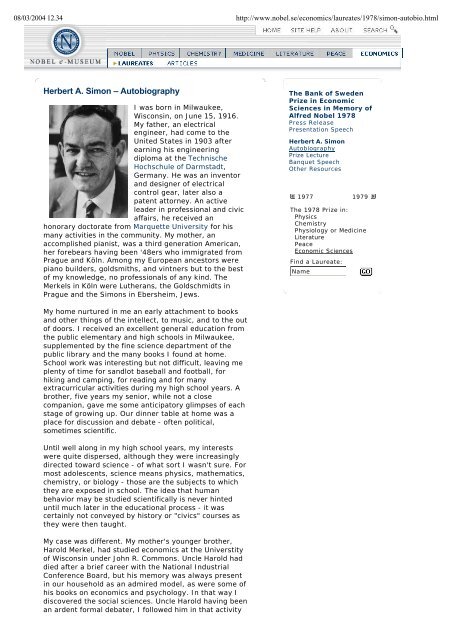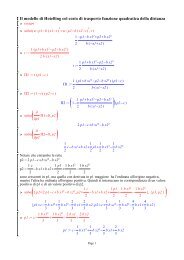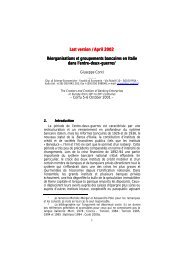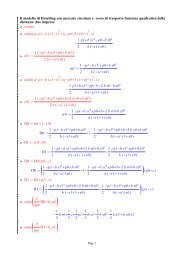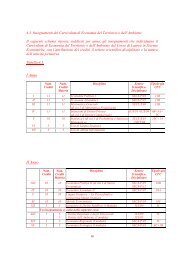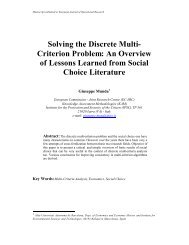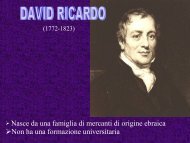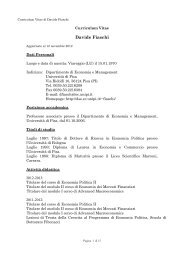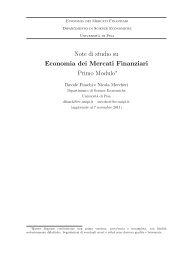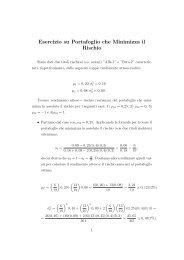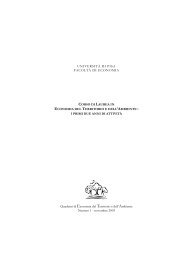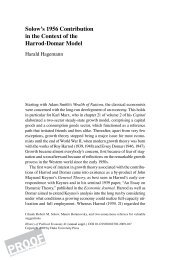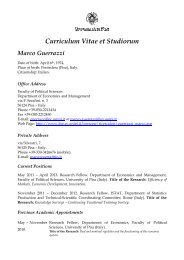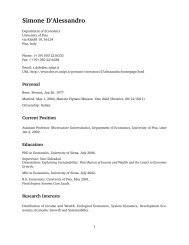Herbert A. Simon - Autobiography
Herbert A. Simon - Autobiography
Herbert A. Simon - Autobiography
You also want an ePaper? Increase the reach of your titles
YUMPU automatically turns print PDFs into web optimized ePapers that Google loves.
08/03/2004 12.34 http://www.nobel.se/economics/laureates/1978/simon-autobio.html<br />
<strong>Herbert</strong> A. <strong>Simon</strong> – <strong>Autobiography</strong><br />
I was born in Milwaukee,<br />
Wisconsin, on June 15, 1916.<br />
My father, an electrical<br />
engineer, had come to the<br />
United States in 1903 after<br />
earning his engineering<br />
diploma at the Technische<br />
Hochschule of Darmstadt,<br />
Germany. He was an inventor<br />
and designer of electrical<br />
control gear, later also a<br />
patent attorney. An active<br />
leader in professional and civic<br />
affairs, he received an<br />
honorary doctorate from Marquette University for his<br />
many activities in the community. My mother, an<br />
accomplished pianist, was a third generation American,<br />
her forebears having been '48ers who immigrated from<br />
Prague and Köln. Among my European ancestors were<br />
piano builders, goldsmiths, and vintners but to the best<br />
of my knowledge, no professionals of any kind. The<br />
Merkels in Köln were Lutherans, the Goldschmidts in<br />
Prague and the <strong>Simon</strong>s in Ebersheim, Jews.<br />
The Bank of Sweden<br />
Prize in Economic<br />
Sciences in Memory of<br />
Alfred Nobel 1978<br />
Press Release<br />
Presentation Speech<br />
<strong>Herbert</strong> A. <strong>Simon</strong><br />
<strong>Autobiography</strong><br />
Prize Lecture<br />
Banquet Speech<br />
Other Resources<br />
1977 1979<br />
The 1978 Prize in:<br />
Physics<br />
Chemistry<br />
Physiology or Medicine<br />
Literature<br />
Peace<br />
Economic Sciences<br />
Find a Laureate:<br />
Name<br />
My home nurtured in me an early attachment to books<br />
and other things of the intellect, to music, and to the out<br />
of doors. I received an excellent general education from<br />
the public elementary and high schools in Milwaukee,<br />
supplemented by the fine science department of the<br />
public library and the many books I found at home.<br />
School work was interesting but not difficult, leaving me<br />
plenty of time for sandlot baseball and football, for<br />
hiking and camping, for reading and for many<br />
extracurricular activities during my high school years. A<br />
brother, five years my senior, while not a close<br />
companion, gave me some anticipatory glimpses of each<br />
stage of growing up. Our dinner table at home was a<br />
place for discussion and debate - often political,<br />
sometimes scientific.<br />
Until well along in my high school years, my interests<br />
were quite dispersed, although they were increasingly<br />
directed toward science - of what sort I wasn't sure. For<br />
most adolescents, science means physics, mathematics,<br />
chemistry, or biology - those are the subjects to which<br />
they are exposed in school. The idea that human<br />
behavior may be studied scientifically is never hinted<br />
until much later in the educational process - it was<br />
certainly not conveyed by history or "civics" courses as<br />
they were then taught.<br />
My case was different. My mother's younger brother,<br />
Harold Merkel, had studied economics at the Universtity<br />
of Wisconsin under John R. Commons. Uncle Harold had<br />
died after a brief career with the National Industrial<br />
Conference Board, but his memory was always present<br />
in our household as an admired model, as were some of<br />
his books on economics and psychology. In that way I<br />
discovered the social sciences. Uncle Harold having been<br />
an ardent formal debater, I followed him in that activity
08/03/2004 12.34 http://www.nobel.se/economics/laureates/1978/simon-autobio.html<br />
too.<br />
In order to defend free trade, disarmament, the single<br />
tax and other unpopular causes in high school debates,<br />
I was led to a serious study of Ely's economics textbook,<br />
Norman Angell's The Great Illusion, Henry George's<br />
Progress and Poverty, and much else of the same sort.<br />
By the time I was ready to enter the University of<br />
Chicago, in 1933, I had a general sense of direction. The<br />
social sciences, I thought, needed the same kind of rigor<br />
and the same mathematical underpinnings that had<br />
made the "hard" sciences so brilliantly successful. I<br />
would prepare myself to become a mathematical social<br />
scientist. By a combination of formal training and self<br />
study, the latter continuing systematically well into the<br />
1940s, I was able to gain a broad base of knowledge in<br />
economics and political science, together with<br />
reasonable skills in advanced mathematics, symbolic<br />
logic, and mathematical statistics. My most important<br />
mentor at Chicago was the econometrician and<br />
mathematical economist, Henry Schultz, but I studied<br />
too with Rudolf Carnap in logic, Nicholas Rashevsky in<br />
mathematical biophysics, and Harold Lasswell and<br />
Charles Merriam in political science. I also made a<br />
serious study of graduate-level physics in order to<br />
strengthen and practice my mathematical skills and to<br />
gain an intimate knowledge of what a "hard" science<br />
was like, particularly on the theoretical side. An<br />
unexpected by-product of the latter study has been a<br />
lifelong interest in the philosophy of physics and several<br />
publications on the axiomatization of classical<br />
mechanics.<br />
My career was settled at least as much by drift as by<br />
choice. An undergraduate field study for a term paper<br />
developed an interest in decision-making in<br />
organizations. On graduation in 1936, the term paper<br />
led to a research assistantship with Clarence E. Ridley in<br />
the field of municipal administration, carrying out<br />
investigations that would now be classified as<br />
operations research. The research assistantship led to<br />
the directorship, from 1939 to 1942, of a research group<br />
at the University of California, Berkeley, engaged in the<br />
same kinds of studies. By arrangement with the<br />
University of Chicago, I took my doctoral exams by mail<br />
and moonlighted a dissertation on administrative<br />
decision-making during my three years at Berkeley.<br />
When our research grant was exhausted, in 1942, jobs<br />
were not plentiful and my military obligations were<br />
uncertain. I secured a position in political science at<br />
Illinois Institute of Technology by the intercession of a<br />
friend who was leaving. The return to Chicago had<br />
important, but again largely unanticipated,<br />
consequences for me. At that time, the Cowles<br />
Commission for Research in Economics was located at<br />
the University of Chicago. Its staff included Jacob<br />
Marschak and Tjalling Koopmans who were then<br />
directing the graduate work of such students as<br />
Kenneth Arrow, Leo Hurwicz, Lawrence Klein, and Don<br />
Patinkin. Oscar Lange, not yet returned to Poland, Milton<br />
Friedman, and Franco Modigliani frequently participated<br />
in the Cowles staff seminars, and I also became a<br />
regular participant.<br />
That started me on a second education in economics,<br />
supplementing the Walrasian theory and<br />
Neyman-Pearson statistics I had learned earlier from
08/03/2004 12.34 http://www.nobel.se/economics/laureates/1978/simon-autobio.html<br />
Henry Schultz (and from Jerzy Neyman in Berkeley) with<br />
a careful study of Keyne's General Theory (made<br />
comprehensible by the mathematical models proposed<br />
by Meade, Hicks, and Modigliani), and the novel<br />
econometric techniques being introduced by Frisch and<br />
investigated by the Cowles staff. With considerable<br />
excitement, too, we examined Samuelson's new papers<br />
on comparative statics and dynamics.<br />
I was soon co-opted by Marschak into participating in<br />
the study he and Sam Schurr were directing of the<br />
prospective economic effects of atomic energy. Taking<br />
responsibility for the macroeconomic parts of that study,<br />
I used as my analytic tools both classical Cobb-Douglas<br />
functions, and the new activity analysis being developed<br />
by Koopmans. Although I had earlier published papers<br />
on tax incidence (1943) and technological development<br />
(1947), the atomic energy project was my real baptism<br />
in economic analysis. My interest in mathematical<br />
economics having been aroused, I continued active work<br />
on problems in that domain, mainly in the period from<br />
1950 to 1955. It was during this time that I worked out<br />
the relations between causal ordering and identifiability<br />
- coming for the first time in contact with the related<br />
work of Herman Wold - discovered and proved (with<br />
David Hawkins) the Hawkins-<strong>Simon</strong> theorem on the<br />
conditions for the existence of positive solution vectors<br />
for input-output matrices, and developed (with Albert<br />
Ando) theorems on near-decomposability and<br />
aggregation.<br />
In 1949, Carnegie Institute of Technology received an<br />
endowment to establish a Graduate School of Industrial<br />
Administration. I left Chicago for Pittsburgh to participate<br />
with G.L. Bach, William W. Cooper, and others in<br />
developing the new school. Our goal was to place<br />
business education on a foundation of fundamental<br />
studies in economics and behavioral science. We were<br />
fortunate to pick a time for launching this venture when<br />
the new management science techniques were just<br />
appearing on the horizon, together with the electronic<br />
computer. As one part of the effort, I engaged with<br />
Charles Holt, and later with Franco Modigliani and John<br />
Muth, in developing dynamic programming techniques -<br />
the so-called "linear decision rules" - for aggregate<br />
inventory control and production smoothing. Holt and I<br />
derived the rules for optimal decision under certainty,<br />
then proved a certainty-equivalence theorem that<br />
permitted our technique to be applied under conditions<br />
of uncertainty. Modigliani and Muth went on to construct<br />
efficient computational algorithms. At this same time,<br />
Tinbergen and Theil were independently developing very<br />
similar techniques for national planning in the<br />
Netherlands.<br />
Meanwhile, however, the descriptive study of<br />
organizational decision-making continued as my main<br />
occupation, in this case in collaboration with Harold<br />
Guetzkow, James March, Richard Cyert and others. Our<br />
work led us to feel increasingly the need for a more<br />
adequate theory of human problem-solving if we were<br />
to understand decisions. Allen Newell, whom I had met<br />
at the Rand Corporation in 1952, held similar views.<br />
About 1954, he and I conceived the idea that the right<br />
way to study problem-solving was to simulate it with<br />
computer programs. Gradually, computer simulation of<br />
human cognition became my central research interest,<br />
an interest that has continued to be absorbing up to the<br />
present time.
08/03/2004 12.34 http://www.nobel.se/economics/laureates/1978/simon-autobio.html<br />
My research on problem-solving left me relatively little<br />
opportunity to do work of a more classical sort in<br />
economics. I did, however, continue to develop<br />
stochastic models to explain the observed<br />
highly-skewed distributions of sizes of business firms.<br />
That work, in collaboration with Yuji Ijiri and others, was<br />
summarized in a book published just two years ago.<br />
In this sketch, I have said less about my work on<br />
decision-making than about my other research in<br />
economics because the former is discussed at greater<br />
length in my Nobel lecture. I have also left out of this<br />
account those very important parts of my life that have<br />
been occupied with my family and with non-scientific<br />
pursuits. One of my few important decisions, and the<br />
best, was to persuade Dorothea Pye to marry me on<br />
Christmas Day, 1937. We have been blessed in being<br />
able to share a wide range of our experiences, even to<br />
publishing together in two widely separate fields: public<br />
administration and cognitive psychology. We have<br />
shared also the pleasures and responsibilities of raising<br />
three children, none of whom seem imitative of their<br />
parents' professional directions, but all of whom have<br />
shaped for themselves interesting and challenging lives.<br />
My interests in organizations and administration have<br />
extended to participation as well as observation. In<br />
addition to three stints as a university department<br />
chairman, I have had several modest public<br />
assignments. One involved playing a role, in 1948, in the<br />
creation of the Economic Cooperation Administration, the<br />
agency that administered Marshall Plan aid for the U.S.<br />
Government. Another, more frustrating, was service on<br />
the President's Science Advisory Committee during the<br />
last year of the Johnson administration and the first<br />
three years of the Nixon administration. While serving<br />
on PSAC, and during another committee assignment<br />
with the National Academy of Sciences, I have had<br />
opportunities to take part in studies of environmental<br />
protection policies. In all of this work, I have tried - I<br />
know not with what success - to apply my scientific<br />
knowledge of organizations and decision-making, and,<br />
conversely, to use these practical experiences to gain<br />
new research ideas and insights.<br />
In the "politics" of science, which these and other<br />
activites have entailed, I have had two guiding principles<br />
- to work for the "hardening" of the social sciences so<br />
that they will be better equipped with the tools they<br />
need for their difficult research tasks; and to work for<br />
close relations between natural scientists and social<br />
scientists so that they can jointly contribute their special<br />
knowledge and skills to those many complex questions<br />
of public policy that call for both kinds of wisdom.<br />
From Nobel Lectures, Economics 1969-1980, World Scientific<br />
Publishing Co., Singapore<br />
<strong>Herbert</strong> A. <strong>Simon</strong> died in 2001.<br />
SITE FEEDBACK CONTACT TELL A FRIEND PRINTER-FRIENDLY PAGE BACK TO TOP<br />
Last modified November 13, 2003<br />
The Official Web Site of The Nobel Foundation<br />
Copyright© 2004 The Nobel Foundation


